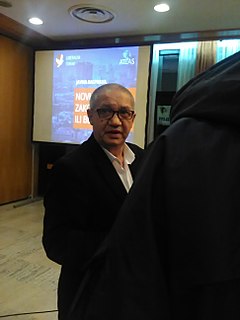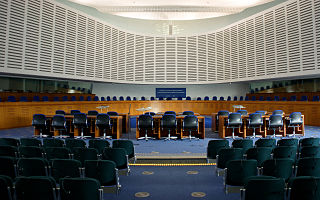
The European Convention on Human Rights is an international convention to protect human rights and political freedoms in Europe. Drafted in 1950 by the then newly formed Council of Europe, the convention entered into force on 3 September 1953. All Council of Europe member states are party to the Convention and new members are expected to ratify the convention at the earliest opportunity.

The International Court of Justice, sometimes known as the World Court, is one of the six principal organs of the United Nations (UN). It settles disputes between states in accordance with international law and gives advisory opinions on international legal issues. The ICJ is the only international court that adjudicates general disputes between countries, with its rulings and opinions serving as primary sources of international law.

The European Court of Human Rights, also known as the Strasbourg Court, is an international court of the Council of Europe which interprets the European Convention on Human Rights. The court hears applications alleging that a contracting state has breached one or more of the human rights enumerated in the Convention or its optional protocols to which a member state is a party. The European Convention on Human Rights is also referred to by the initials "ECHR". The court is based in Strasbourg, France.

The Inter-American Court of Human Rights is an international court based in San José, Costa Rica. Together with the Inter-American Commission on Human Rights, it was formed by the American Convention on Human Rights, a human rights treaty ratified by members of the Organization of American States (OAS).

The Committee of Ministers of the Council of Europe or Committee of Ministers is the Council of Europe's decision-making body. It comprises the Foreign Affairs Ministers of all the member states, or their permanent diplomatic representatives in Strasbourg. It is both a governmental body, where national approaches to problems facing European society can be discussed on an equal footing, as well as a collective forum, where Europe-wide responses to such challenges are formulated. In collaboration with the Parliamentary Assembly, it is the guardian of the Council's fundamental values; it monitors member states' compliance with their undertakings.
The Human Rights Chamber for Bosnia and Herzegovina, which was active between March 1996 and 31 December 2003, was a judicial body established in Bosnia and Herzegovina within the Annex 6 to the General Framework Agreement for Peace in Bosnia and Herzegovina.
The Church of Scientology Moscow v Russia [2007] ECHR 258 is a European Court of Human Rights case, concerning Article 11 of the Convention. In the case the European Court of Human Rights in Strasbourg condemned Moscow City Government's refusal to consider the Church of Scientology of Moscow for registration as a religious organisation, and as a result found that Russia had violated the rights of the Church of Scientology under Articles 11 when "read in the light of Article 9". Specifically, the Court determined that, in denying consideration of registration to the Church of Scientology of Moscow, the Moscow authorities "did not act in good faith and neglected their duty of neutrality and impartiality vis-à-vis the applicant's religious community". The Court also awarded the Church €10,000 in respect of non-pecuniary damage and €15,000 for costs and expenses.
Judicial review is a part of UK constitutional law that enables people to challenge the exercise of power, often by a public body. A person who feels that an exercise of power is unlawful may apply to the Administrative Court for a court to decide whether a decision followed the law. If the court finds the decision unlawful it may have it set aside (quashed) and possibly award damages. A court may impose an injunction upon the public body.

R (Carson) v Secretary of State for Work and Pensions and R v Secretary of State for Work and Pensions were a series of civil action court cases seeking judicial review of the British government's policies under the Human Rights Act 1998. They related to the right to property under Article 1 of the First Protocol and prohibition of discrimination under Article 14 of the convention. In Reynolds's case, there was also Article 8 of the European Convention on Human Rights (ECHR), the right to respect for "private and family life" to be considered, as well as Article 3 of the ECHR, the prohibition of torture, and "inhuman or degrading treatment or punishment".
Andrejeva v. Latvia (55707/00) was a case decided by the Grand Chamber of the European Court of Human Rights in 2009. It concerned ex parte proceedings and discrimination in calculating retirement pensions for non-citizens of Latvia.

Sejdić and Finci v. Bosnia and Herzegovina was a case decided by the Grand Chamber of the European Court of Human Rights in December 2009, in the first judgment finding a violation of Article 14 of the European Convention on Human Rights taken in conjunction with Article 3 of Protocol No. 1 thereof, with regard to the arrangements of the Constitution of Bosnia and Herzegovina in respect of the House of Peoples of Bosnia and Herzegovina, and a violation of Article 1 of Protocol No. 12 with regard to the constitutional arrangements on the Presidency of Bosnia and Herzegovina.
Arenz, Röder and Dagmar v. Germany was a case decided by the UN Human Rights Committee in 2004.
D.H. and Others v. the Czech Republic was a case decided by the European Court of Human Rights (ECtHR) concerning discrimination of Romani children in the education system of the Czech Republic. It was the first case of racial segregation in education to be considered by the ECtHR. As of 2021 the case is still pending at the Committee of Ministers and has not been resolved by the Czech authorities.
Vogt v. Germany (1996) 21 EHRR 205, (17851/91) was a case decided by the European Court of Human Rights (ECHR) in 1995. The case concerned a Mrs. Vogt who was suspended from her teaching job at a public secondary school because of her past membership in the German Communist Party. The ECHR ruled that this application of Berufsverbot violated provisions in the European Convention on Human Rights relating to freedom of expression and freedom of association.
Oršuš and Others v. Croatia (15766/03) was a case heard before the European Court of Human Rights, concerning activities of Roma-only classes in some schools of Croatia, which were held legal by the Constitutional Court of Croatia in 2007 by a decision no. U-III-3138/2002.
Marckx v. Belgium was a landmark case in family law decided by the European Court of Human Rights in 1979.

Carson and Others v. The United Kingdom [2008] ECHR 1194 was heard by the European Court of Human Rights (ECHR), Fourth Section in Strasbourg on 4 November 2008 appeal from the Appellate Committee of the House of Lords before Lech Garlicki (President); Nicolas Bratza; Giovanni Bonello; Ljiljana Mijović; David Thór Björgvinsson; Ledi Bianku; Mihai Poalelungi.

Carson and Others v. The United Kingdom [2010] ECHR 338 was heard by the European Court of Human Rights (ECHR), in Strasbourg on 16 March 2010 on appeal from the European Court of Rights (ECHR), Fourth Section before Jean-Paul Costa (President), Christos Rozakis, Nicolas Bratza, Peer Lorenzen, Françoise Tulkens, Josep Casadevall, Karel Jungwiert, Nina Vajić, Dean Spielmann, Renate Jaeger, Danutė Jočienė, Ineta Ziemele, Isabelle Berro-Lefèvre, Päivi Hirvelä, Luis López Guerra, Mirjana Lazarova Trajkovska, Zdravka Kalaydjieva.
In September 1967, Denmark, Norway, Sweden and the Netherlands brought the Greek case to the European Commission of Human Rights, alleging violations of the European Convention of Human Rights (ECHR) by the Greek junta, which had taken power earlier that year. In 1969, the Commission found serious violations, including torture; the junta reacted by withdrawing from the Council of Europe. The case received significant press coverage and was "one of the most famous cases in the Convention's history", according to legal scholar Ed Bates.







